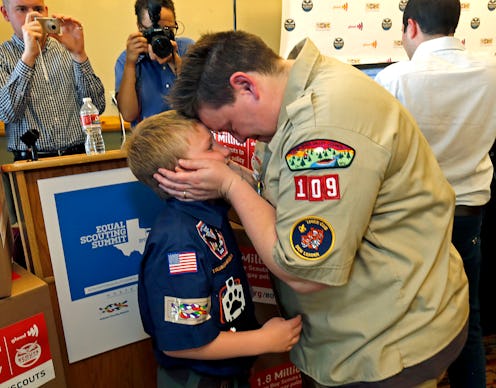News
Boys Scouts Are Changing, But Is it Enough?
Here's a good reason to down an extra glass of bubbly on New Year's eve: starting Jan.1, the Boy Scouts of America will accept openly gay youths, finally enacting a policy change made back in May that lifted the group's ban on homosexual scouts. But hold on to your rainbow-confetti: although allowing gay scouts is a welcome improvement, the BSA will still be keeping its prohibition on gay adults serving as troop leaders, staffers or volunteers. Which, as we say hello to the year 2014, seems pretty medieval.
There are roughly 110,000 Scout units across the U.S., 70 percent of which are sponsored by religious groups, many of whom have voiced disappointment in the policy change. Back in June, the Southern Baptist Convention — a major BSA sponsor — predicted a "mass exodus" of youths from the program due to the policy, and urged a repeal of the change, but ultimately left it up to the churches themselves to decide whether to keep sponsoring the Scouts.
For those of us living in the 21st century, though, the realities of the policy change won't come as a surprise. Although some churches admittedly did drop their sponsorship of Scout units because of the new policy, no major sponsors decided to sever ties and — shock-horror! — there hasn't been a great shift in the number of Boy Scout enrollments. In fact, the Scouts' biggest sponsor— the Utah-based Church of Jesus Christ of Latter-day Saints — not only promised to keep its relationship with the BSA, it even praised the group for its "thoughtful, good-faith effort" in dealing with the issue.
“There hasn’t been a whole lot of fallout. If a church said they wouldn’t work with us, we’d have a church right down the street say, `We’ll take the troop, ” said a BSA national executive board member. In fact, the BSA is hoping for the change to be as understated as possible: "It's business as usual, nothing happens and we move forward," he added.
The new policy — which ensures that youths can no longer be excluded from the Cub Scouts, Boy Scouts or coed Venturers program solely because of sexual orientation — was approved in May, with support from 60 percent of the 1,400 voting members of the BSA's National Council.
But the changes are coming with some worrying caveats: the BSA will be pushing for more individual privacy, moving away from the traditional group showers and giving Scouts — and parents of Scouts — the power to reject tent partners. "If a Scout or parent of a Scout makes a request to not tent with another Scout, their wishes should be honored," says the BSA, giving the impression that being gay necessarily entails irrepressible sexual urges. And Scouts will not be allowed to in any way "promote" gay rights: "No member may use Scouting to promote or advance any social or political position or agenda, including on the matter of sexual orientation," the BSA says.
The homophobic undercurrent comes part-and-parcel with the policy change, however. The fact that gay youths are allowed to join the 2.6 million young Scouts but gay adults are still barred from being part of the 1 million other adult leaders is actually sending a shocking message. As Andrea Bonior of the Huffpost reported at the time,
"A serious step backwards for civil rights and, for that matter, informed public opinion (and science education!), this decision tacitly supports the misguided thinking that same-sex attraction makes someone a likely child predator. This is a significant obstacle to gay rights in the court of public opinion, especially for gay men. Despite the BSA's supposed awareness that there is no evidence that being gay puts someone at an elevated risk of being sexually attracted to children or abusing them, there is simply no other way to justify the BSA's decision than with the misinformed and bigoted notion that gay men are dangerous."
Futhermore, as Bonior points out, there's a practial issue with the policy as well.
"If scouts are allowed to be gay, but troop leaders are not, at what point do they get kicked out? Long-range strategy was clearly not the policy makers' strong point. Will they now let in an openly gay 17 year-old scout, only to tell him his role in the organization will have to diminish once his birthday rolls around? As a technical policy, this seems about as straightforward, clear, and logical as your average piece of tax legislation."
There is one ray of hope in the new year: the forthcoming president of the BSA, former Defense Secretary Robert Gates, due to take over in the spring. Many have their fingers crossed that Gates, who was integral in changing the military's policy excluding gay soldiers, will see to it that the BSA's ban on gay adult leaders will become a thing of the past.
